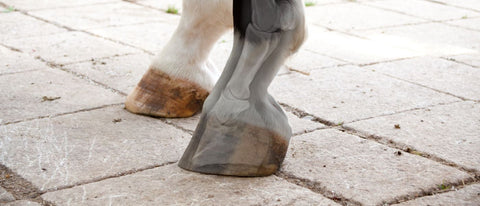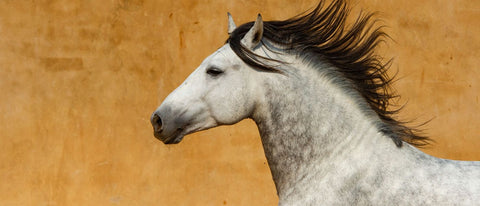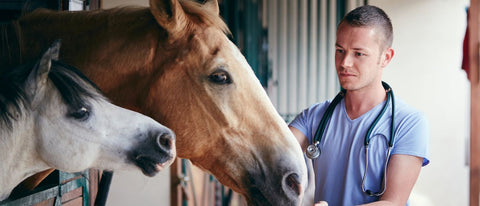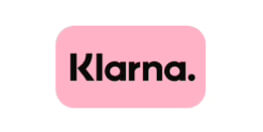
Florian ist aufgewachsen auf einem Bauernhof. Umgeben von Pferden, entdeckte er früh seine Faszination für diese majestätischen Tiere. Inspiriert von seiner reitbegeisterten Mutter, entwickelte er das Nahrungsergänzungmittel - Pferdegold. Seine tiefe Verbundenheit zur Natur und die leidenschaftliche Hingabe zu Pferden trieben ihn an, sein Unternehmen zu gründen.
Calcium is not only an essential mineral for us humans. Calcium also performs crucial functions in your horse's body.
From developing strong bones to supporting muscle function and nerve transmission, calcium is a true all-rounder. But how much calcium does a horse really need?
And what role does the calcium-phosphorus ratio play in horses' nutrition? Let's learn more about calcium for horses and find out how horses can be optimally supplied with calcium.

The interaction of calcium and phosphorus
Calcium and phosphorus are two essential minerals that work hand in hand to ensure your horse's health. Both are vital for strong bones and healthy teeth .
The correct calcium-phosphorus ratio is crucial for horses.
While insufficient calcium intake in the feed can lead to a deficiency, an excess of phosphorus can hinder calcium absorption and disrupt the natural balance of these minerals .
A disturbed calcium-phosphorus ratio can lead to deficiency symptoms and health challenges.
Daily calcium requirement for horses
Every horse has individual needs when it comes to daily calcium intake.
But how much calcium per day is really necessary?
In its " Nutrient Requirements of Horses Study, " the National Research Council recommends a daily calcium intake of 20 grams for an adult, inactive horse weighing 500 kilograms .
With light to intense exercise, this requirement increases to 30 to 40 grams per day.
It is important to know the exact calcium requirement , because only then do you have a chance of preventing deficiencies and ensuring the well-being of your horse.
A balanced diet that meets calcium requirements is the key to an active horse life.

Perfect for your horse: Pferdegold® supplementary feed!
These specially developed supplements support your horse's diet and provide it with natural nutrients. Made in Germany, grain-free and drug-free, with a 30-day money-back guarantee.
Try it now!Increased calcium requirements of your horse: When it is especially important
There are phases in a horse's life when calcium requirements increase. This can be during intensive growth phases , during pregnancy , or during periods of intense exercise .
During such times, it is especially important to ensure adequate calcium intake to prevent deficiency symptoms.
Calcium deficiency: causes, symptoms and consequences
A balanced calcium balance is essential for your horse's well-being and vitality .
But what happens if there is a shortage?

How can a calcium deficiency occur?
Calcium deficiency in horses can be caused by a variety of factors. In addition to an unbalanced diet, lack of access to adequate calcium sources , or impaired calcium absorption in the intestine, certain diseases or medications can also interfere with calcium utilization.
In addition, the supply of vitamin D plays a key role. This vitamin is essential for the absorption of calcium and phosphorus from the intestine.
Although horses can produce vitamin D themselves , they need sufficient sunlight to do so.
A horse that is kept mostly in a stable and is exposed to little sunlight can therefore develop a calcium deficiency, even if the feed ration contains sufficient calcium.
These are typical symptoms of a deficiency
Calcium deficiency in horses manifests itself through various symptoms, including muscle tremors, nervousness , and an increased susceptibility to bone fractures .
It is important to recognize these symptoms early in order to help the horse in time.
The symptoms of a calcium deficiency can vary, but they all indicate that something is wrong with the horse's mineral balance.

What are the consequences of a calcium deficiency?
-
Bone problems: A persistent calcium deficiency can lead to osteoporosis and other bone diseases.
-
Muscle problems: Without sufficient calcium, muscle cramps and weakness can occur.
-
Nerve problems: Calcium plays a role in nerve transmission, and a deficiency can lead to nervousness and overexcitability.
-
Digestive problems: A lack of calcium can impair digestive function and lead to colic.
- Heart problems: An imbalanced calcium level can affect the cardiovascular system and lead to cardiac arrhythmias.
Can an overdose of the mineral occur?
Yes, a calcium overdose is possible in horses. While calcium is an essential mineral for your horse's health , excessive intake can lead to health problems.
A calcium overdose can disrupt the balance of other vital minerals in the body and lead to complications such as kidney problems, cardiac arrhythmias or digestive problems .
It is therefore important to carefully monitor calcium intake and ensure that your horse does not receive excessive calcium.
Conclusion
Calcium is a key mineral that is essential for your horse's well-being.
Not only does it support strong bones and muscles, but it also plays a role in numerous other bodily functions.
It's always about finding the right balance, neither too much nor too little.
FAQ
How do I know if my horse is getting enough calcium?
The best way to determine if your horse is getting enough calcium is to have a blood test done by a veterinarian.
Additionally, external signs such as a shiny coat, strong bones and good muscle mass can indicate that your horse is well supplied with calcium.
Can I give my horse calcium through natural foods?
Yes, there are numerous natural food sources that contain calcium. These include certain grasses and hays.
However, it is essential to check your horse's diet regularly to ensure that it is receiving all the nutrients it needs in the right amounts.
How does stress affect my horse's calcium needs?
Stress can affect your horse's mineral balance, including calcium. Stress can lead to increased calcium loss through urine, which can increase the need for this mineral.
It is important to minimize stress factors and adjust your diet accordingly.
Are older horses more susceptible to calcium deficiency?
Yes, older horses may be more susceptible to calcium deficiency because their ability to absorb nutrients may decrease with age.
It is important to carefully monitor the diet of older horses and make adjustments as needed to ensure they receive all the necessary nutrients.
Learn more about horse health and discover our next guides!

















